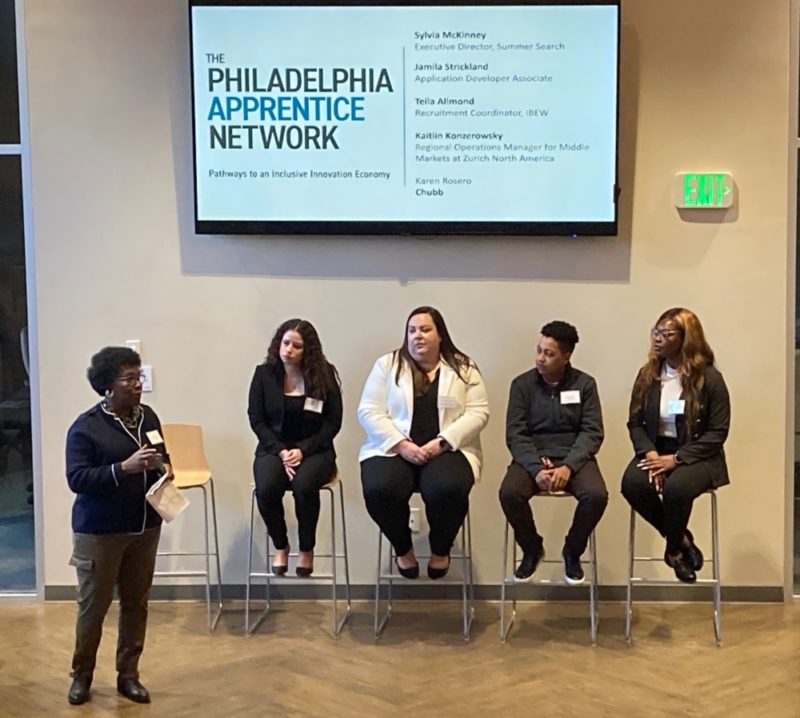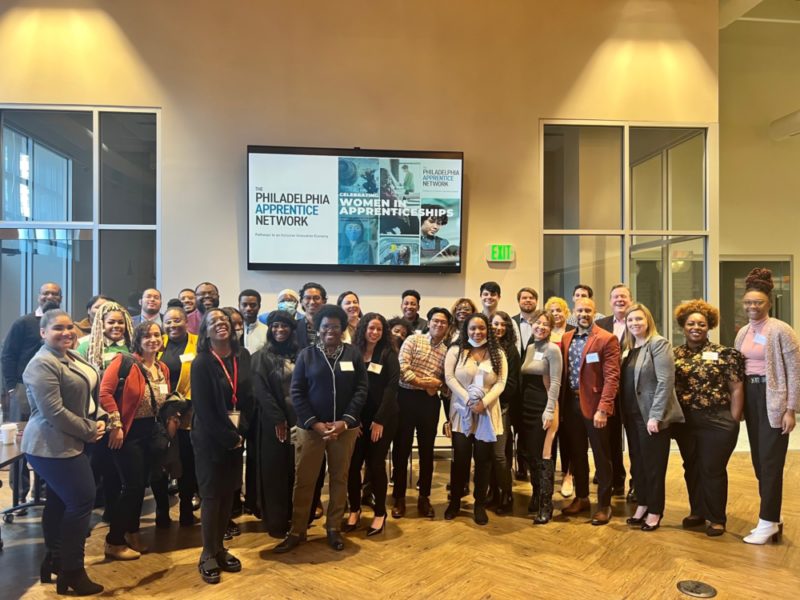These paid, hands-on training programs have helped people with nontraditional backgrounds find a field and job that works for them across industries. The US Department of Labor’s Employment and Training Administration counts a 64% growth in new apprentices since 2012, for a total of nearly 242,000 individuals as of Fiscal Year 2021. Companies are increasingly hosting tech apprenticeships as a way to educate future software developers and shape new recruits who understand their technology.
As part of mid-November’s National Apprenticeship Week, the Philadelphia Apprenticeship program, which launched in 2021, hosted a panel called “Women in Apprenticeships” moderated by Sylvia McKinney, executive director of Summer Search.
The panel featured current and past apprentices Jamila Strickland, application developer associate at Accenture; Karen Rosero, an apprentice at Chubb; and Teila Allmond, recruitment coordinator at IBEW Local 98, the electricians union. Apprentice Manager Kaitlin Konzerowsky, regional operations manager for middle markets at Zurich North America, also joined.
The panelists shared their own career journeys and discussed the value of apprenticeships and how to make the most out of them. Here are some of their tips.

(L to R) Sylvia McKinney, Karen Rosero, Kaitlin Konzerowsky, Teila Allmond and Jamila Strickland. (Courtesy photo)
1. Rely on your team for support.
Strickland said she has a relationship with her team members where she can call any of them to talk through an issue, which has helped her feel more comfortable as she settles into her role. Her bosses also encourage her to learn new things on the job, check in regularly with how she’s doing, and offer feedback about how to improve her work.
“Being an apprentice, sometimes you can feel like a burden on your team because you don’t know as much as everyone else does,” she said of her new technical role. “That really impressed me and encouraged me to work harder because they see something in me — clearly it’s there, and I want to continue that with them.”
Allmond relied on her instructors any time she felt unsure or uncomfortable, especially as a woman in a trade field, and they supported her, she said. Rosero noted it was helpful to have multiple support sources — her team, manager and coach — who answered her questions and were available to help as needed.
From a manger’s perspective, Konzerowsky said her company assigns a general mentor to each apprentice as well as a team-specific mentor. She said they also have frequent check ins with apprentices.
“We just want to make sure we set everyone up for success because their success is ultimately ours as employers,” Konzerowsky said. “You’re building a stronger workforce, especially in a time where hiring and recruiting can be a challenge.”
2. Know that you can handle imposter syndrome.
Strickland feels imposter syndrome the same as any other person, but reminds herself that she worked hard to get where she is and that her bosses picked her for a reason. A good way to battle it is also to ask your teammates or peers if there’s something you should improve on, she said.
Allmond said she focuses on doing what she can to improve herself: “As long as I’m fulfilling what I think makes me feel good, it makes me happy.”
3. Be an example for the next generation.
“I know how it is to start something new, and you don’t know what to do and you don’t know who to talk to,” Rosero said. Thus, she wants to be able to help the next group of apprentices with the same resources that helped her. “When that time comes, I’m definitely there.”
Strickland said she’ll be transparent with the apprentices that come after her so they know the work is not always glamorous, and that it’s normal to struggle sometimes.
Allmond thinks of her current position is an opportunity to encourage other young women to pursue careers in the trades.
“I want to make young me have an easier time with everything that I experienced,” she said. The tech industry has a “stigma” of being “really macho and all that — and it’s really not. It’s really just a really good career where you can actually thrive as a woman, as a man, whatever color you are.”
4. Network, network, network!
Philadelphia City Councilmember-At-Large Katherine Gilmore Richardson attended the panel and gave this well-worn advice: “Your network is your net worth.”
“Get it? It goes both ways,” she said. “Always collect cards in every room you’re going in, talk to as many people as you can.”
Strickland agreed: She said she doesn’t think she would be where she is today without introducing herself to people, including her current bosses.
Sarah Huffman is a 2022-2024 corps member for Report for America, an initiative of The Groundtruth Project that pairs young journalists with local newsrooms. This position is supported by the Lenfest Institute for Journalism.
This editorial article is a part of How I Got Here Month of Technical.ly's editorial calendar.
Before you go...
Please consider supporting Technical.ly to keep our independent journalism strong. Unlike most business-focused media outlets, we don’t have a paywall. Instead, we count on your personal and organizational support.
Join our growing Slack community
Join 5,000 tech professionals and entrepreneurs in our community Slack today!

The person charged in the UnitedHealthcare CEO shooting had a ton of tech connections

From rejection to innovation: How I built a tool to beat AI hiring algorithms at their own game

Where are the country’s most vibrant tech and startup communities?


